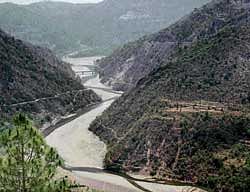Hills rumble with dissent

For the communities living in picture post card hamlets pock-marking the mighty hills along the Giri river in Himachal Pradesh, the thought of losing their homes and hearths so that water flows through the taps in Delhi homes seems both unjust and horrific.
The reality of impending displacement is, though, dawning on them and the normally reticent and simple village folks have suddenly found a voice to oppose the proposed Renuka Dam project over the river in Renuka in Sirmour district of the hill state.
The dam versus people conflict seems like a cliché, but its reverberation is finding an echo through some 37 villages set to be submerged in the reservoir upstream of the proposed dam, which is likely to displace over 750 families. Conceived to meet Delhi’s drinking water needs at least for the next 25 years, the Renuka Dam, to be
located about 300 km from the national capital, will supply 23,000 cubic metres per second (cumecs) of water besides generating 40 MW and is likely to cost more than Rs 3,600 crore.
“Delhi should get water but not at our cost,” says a defiant Puran Chand Sharma, secretary of the Renuka Baandh Sangharsh Samiti, one of the nodal organisations leading the local communities’ agitation against the proposed dam. The stored water from the Renuka reservoir will be pumped into the Yamuna River from the Hathnikund barrage to carry the supply to Delhi.
A report prepared by the People for Action for People in Need (PAPN), an NGO opposed to the dam, in collaboration with the ActionAid India, terms the project an “unmitigated disaster” observing that economical, technical, social and environment viability have not been established in a credible manner.
“Besides displacing families from 37 villages, thousands of trees would be cut, nearly 18-km stretch of state highway (from Renuka to Chopal) would be
submerged and local people surviving on agriculture and cash crops will be badly hit,” claims Sharma.
Not that the Delhi government and the dam execution agency, the Himachal Pradesh Power Corporation Ltd (HPPCL), are having it easy to get the project going.
With nearly 40 per cent of the land needed for it coming under forest category, including a wildlife sanctuary spread over 49 hectares, the Ministry of Environment and Forests is withholding forest clearance even though it had accorded environment clearance in October last year.
The HPPCL made yet another presentation recently to the Ministry seeking clearance for over 900 hectares of forest land for the project. “We have presented our case to the ministry. We have been asked to curtail the area for forest diversion to 775 hectares,” says K K Goyal, General Manager of the HPPCL who is guiding the project sitting at his makeshift office inside a private hotel at Dadahu, about three km from the proposed dam site. The ministry has also asked the Himachal government to prepare a viable plan for relocating the Renuka Wildlife Sanctuary and for getting counted the number of trees to be cut in the forest area for the dam project.
Goyal is confident that the project would be set in motion by the end of this year. “We hope to start construction work for one of the three diversion tunnels by December this year,” he says confidently. Delhi Chief Secretary Rakesh Mehta, who visited Renuka recently, was also confident that all hurdles will be cleared by the year end for the dam project to get off the ground.
The Himachal Government has prepared a relief and rehabilitation package for the dam oustees. Goyal claims it was first time in the country that people had been offered the rehabilitation package even before the work on dam project has begun. A chunk of 345 bighas of land has been purchased within Sirmour district to relocate the families of dam oustees.
With the governments’ intent on pursuing the project, the local communities are hoping for a divine intervention from their deity, Goddess Renukaji, to prevent their displacement.
Deccan Herald is on WhatsApp Channels | Join now for Breaking News & Editor's Picks